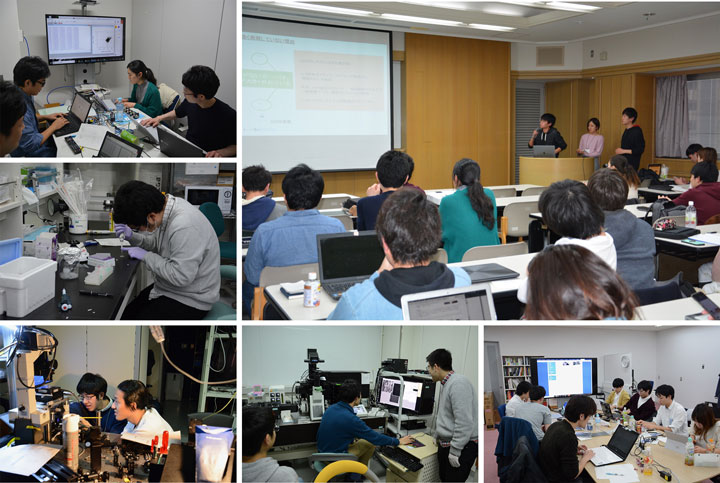RIKEN BDR Spring Course 2019 in Osaka
Mar. 22, 2019

The first BDR Spring Course was held March 4-7 in the RIKEN, Suita, Osaka campus. The Spring Course allows graduate and undergraduate science students to experience RIKEN life science research firsthand. The 52 students who participated came from universities from all parts of Japan.
On the first day, intensive lectures were given by researchers from eight BDR labs. On subsequent days, a preselected group of 32 of the students were trained in nine BDR laboratories. Practical training on advanced imaging technology and advanced data analysis was conducted using the BDR research facilities.
The students worked in teams of two or three, in the laboratories of Drs. Tom Watanabe, Chikara Furusawa and Yasushi Okada, to name but a few of the participating PIs. On the final afternoon, they gave presentations of the results of their work.
On that final afternoon the students were still enthusiastic and gave high energy presentations despite the bleary eyes and occasional nodding off. After the presentations, Laboratory for Cell Polarity Regulation Team Leader Yasushi Okada, who clearly enjoyed the thought-provoking presentations and audience questions said, “We need young researchers to ask new questions in science. If you enjoyed the Spring Course, I encourage you to go into research. We have been doing the spring course for a number of years and a few Spring Course participants are now completing their PhD.”
When BDR started as a reorganization of RIKEN’s three Kansai based life science research centers, the question of which programs will be continued was at the fore. From Dr. Okada’s Quantitative Biology Center (QBiC), the spring course was preserved, much to the delight of students and researchers. QBiC first started the spring course as a lecture only offering in 2012 for undergraduate and graduate students and the response was so enthusiastic that additional hands-on training days were added in subsequent years.
For RIKEN BDR the purpose is to develop the next generation of scientists through hands-on experience with cutting edge research methods. For the students, it is an opportunity to interact with pure researchers and to try their lifestyle for a few days. Of course, after just a few days in the researchers’ lifestyle they were tired!
Were they required to stay up all night to discuss the meaning of life and work on presentations until the last minute? No! But they did it anyway. Did they sleep in the lab? “No!” according to Ryoei Kawabata, a senior from University of the Ryukyus in Okinawa, who described the draw of the spring course. “I was able to study for three days, all day, from morning to evening. There were a lot of excellent people and people were very excited. The accommodation and transportation costs were covered, so I recommend everybody to come and participate."
He went on, "I made a laser microscope by myself. It took about five hours. I thought it would take a little longer, but the researchers enthusiastically helped me. Of course, it was my first time to make a microscope. It was fun!” On his future he said, "I want to make a microscope. Because there is a high cost of parts, I think it would be necessary to think about joint research projects or working at a large institute such as RIKEN."
With their Spring Course training as a start, these students should be well on their way to creating new microscopes and new questions to study dynamic biological phenomena.



